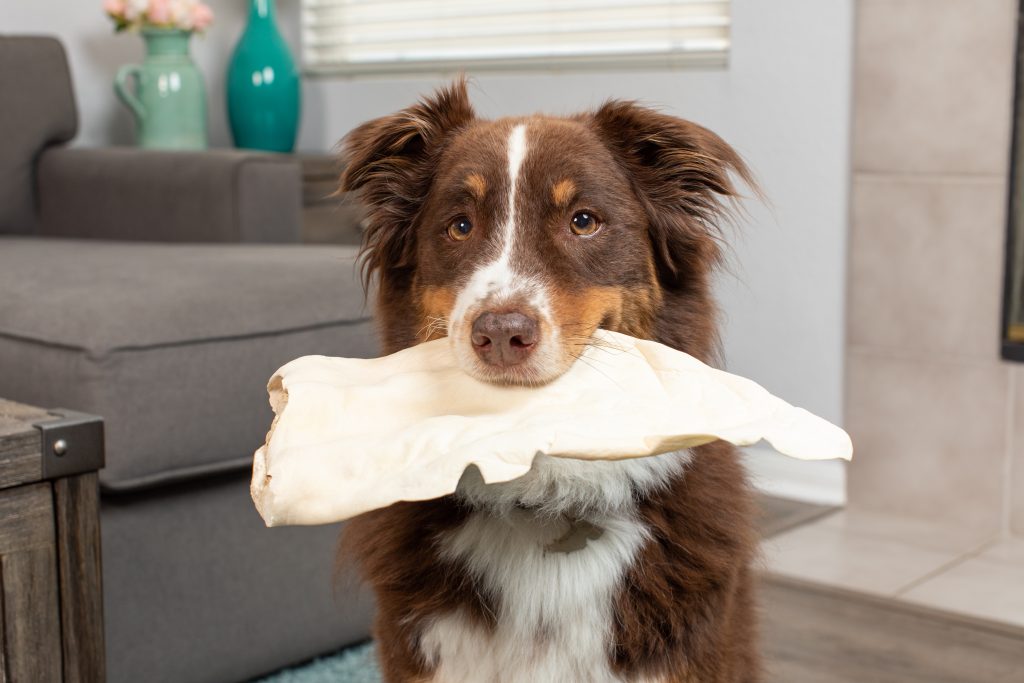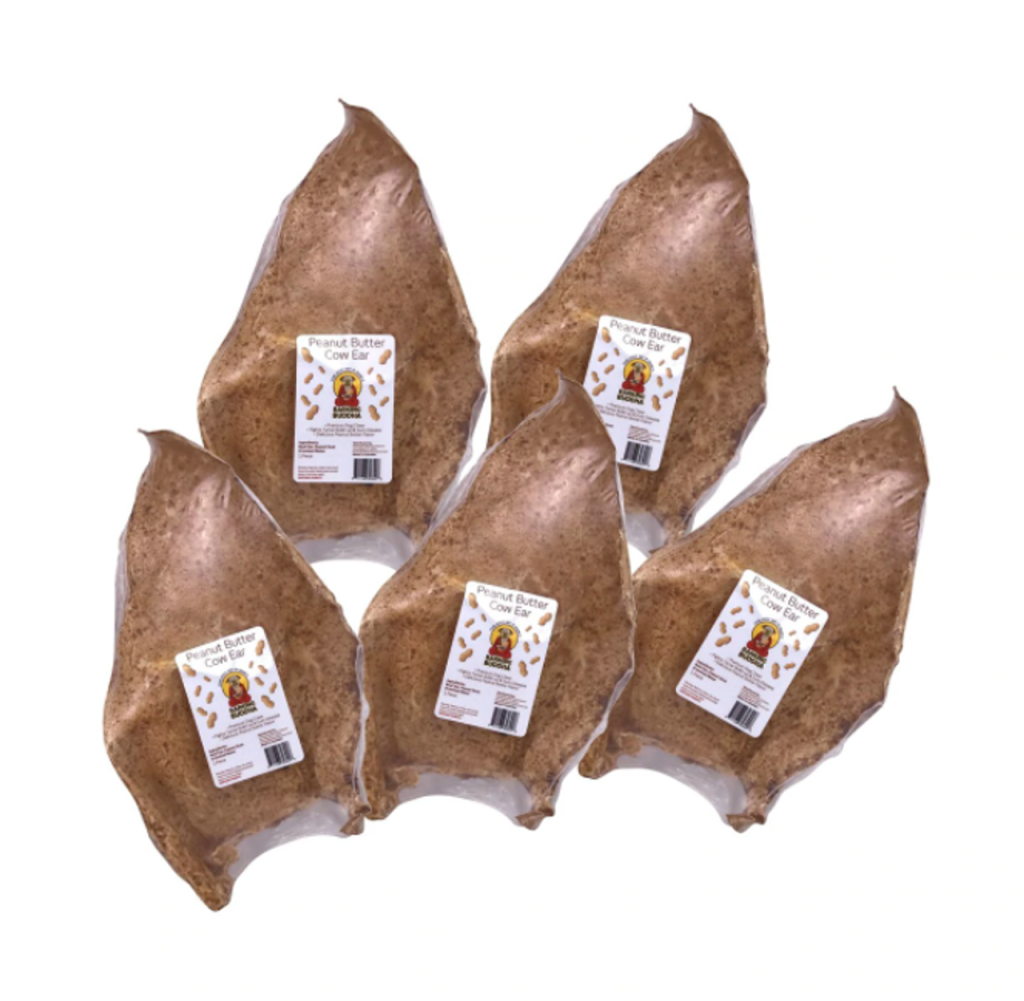Palatable. Nutritional. Low-Calorie. Cow ears make a dog-gone delicious treat for our canine pals. Dogs love the natural beef flavor and the texture on their gums and teeth. They are a hefty source of vitamins, minerals, fatty acids, and protein a pup needs to stay healthy and active.
But Let’s discuss safety first. So the important question is, Are cow ears safe for dogs? YES! Natural cow ears from a reputable source are completely safe for all kinds of dogs. And they will love them!

Cow Ears Are Safer Than Other Chews, Here’s Why
Processed rawhide is a common dog chew that many of our parents or grandparents might have given their dogs. However, we have learned now that rawhide treats can be dangerous to dogs for many reasons. And they are far from natural.
Top Reasons Rawhide is Bad for Dogs
- Small chunks of rawhide have been known to get stuck in a dog’s esophagus or digestional tract. This can lead to surgery being needed and can become a life-threatening situation.
- Rawhide chews have been found to contain and hold on to dangerous bacteria like salmonella. Canines can be susceptible to a large list of bacterial or fungal infections that can lead to serious illness.
- Most rawhide is not a true digestible material. This is because most manufacturers of rawhide use low-quality materials and harsh chemicals in their processes to make their products.
- Rawhide is bad for teeth and can damage them. Furthermore, rawhide has been known to scrape not just plaque but gums. Aggressive chewing can cause sharp pieces to break off and get stuck in their mouth.
- Some dogs are allergic to rawhide or other substances used in manufacturing. Rawhide is that much more dangerous to puppies and older dogs.
Top Reasons Cow Ears are a Better Chew for Dogs
- Cow ears are a natural product, which makes them a highly digestible chew treat. Every bit of it should travel down through the body without harm. In addition to being safely digestible, they are nutritious for dogs too.
- Cow ears are full of healthy oils and clean fats. Rich with minerals, and vitamins that promote their overall health.
- Bacteria like salmonella are less common in high-quality beef products, therefore cow ears are becoming a more popular treat choice.
- Cow ears are naturally hypoallergenic, gluten-free, and can be made with no extra additives or preservatives.
- Chewing on cow ears and other natural chews is a great way to improve a dog’s dental routine. Dental chews help to get rid of plaque and are rich in teeth-healthy chondroitin. Chondroitin has been shown to have a positive effect on dogs suffering from gingivitis. Furthermore, it can even help deter periodontal diseases.
- Cow ears are also a puppy-friendly chew, and appropriate for all breeds and sizes of dog.
Chewing Safety Tips: Preparation and Prevention
“The secret of health for both mind and body is not to mourn for the past, nor to worry about the future, but to live the present moment wisely and earnestly.” -Buddha
Here are five helpful points to remember when keeping our furry friends happy and safe during their zen chew time:
Products
First, finding a trusted brand with quality products for your pets is very important. Research and take time to weed out companies with bad practices and low-quality ingredients. You want to order cow ears from a company where they meet and even exceed quality standards.
Trust a company that makes products under their own care, with the same goal as you, keeping dogs happy and safe. 100 percent all-natural grass-fed beef cow ears roasted to perfection are what dogs crave. However, watch out for products with unnecessary additives or manufacturers using chemical processing.
Hygiene
Secondly, to avoid spreading germs and bacteria to each other. It’s good advice to wash your hands before and after giving your dog a treat. The list of organisms and diseases that can be transferred between animals and humans is extensive.
Supervision
I assure you, they probably won’t notice you are nearby when they are enjoying a delicious cow ear. However, it is highly recommended to keep an eye on them while they enjoy a chew.
Hydration
Keeping the water bowl full is something we, as pet parents, are quite familiar with. H20 helps aid digestion, so having a source of fresh water nearby is also safety-forward.
Moderation
As a rule of paw, we should always moderate our pets’ treat consumption and eating habits. Short-term, over-treating can lead to some awful tummy aches and digestive nightmares. If continued, it can lead to obesity and arthritis issues down the line.
Pet health professionals advise that treat consumption should be about ten percent of their daily caloric intake. Depending on the size of your pup, one cow every other day is a reasonable amount. Experiment and see what’s best for them!

Are Flavored Cow Ears Safe For My Dog?
Yes! Certain flavors like peanut butter can be added to cow ears to give them extra flavor and still be perfectly safe. You might find other flavors on the market too. Look out for delicious flavors like peanut butter, blueberry, or cheese.
The important factors remain mostly in manufacturing. Stay clear of cow ears that were cleaned with the use of harsh chemicals. Instead, buy treats made with all-natural ingredients, that are preservative and additive-free.
Where Can I Find Quality Peanut Butter Cow Ears?
Let them give Barking Buddha’s Peanut Butter Cow Ears a go! They are extra large, thick, and uncut. These cow ears are roasted to absolute perfection, sealing in all of the natural beef flavor. Furthermore, they then add dog-safe peanut butter dust to the mix. Your dog will be an instant fan.
All of Barking Buddha’s long-lasting chews are made in an FDA-approved facility with care. The cattle is sourced from South America and is 100 percent grass-fed beef ear. Grab a pack of peanut butter-flavored cow ears today.
Choking Maneuvers For Dogs
Sadly, accidents do happen especially around our curious chewing canine companions. In a possible choking incident of any kind with your dog. Attempt with all your might to remain calm, have someone call the emergency line, and head to the pet hospital as soon as possible.
Remember to check their mouth, and also down into the throat area. See if you can figure out what might be causing the issue. Perhaps the object can be easily dislodged with a swift hook finger movement.
If comfortable with attempting or already trained with the Heimlich maneuvers for dogs.
If you have a smaller breed of dog or a new puppy. You can start by gently holding your dog in your lap, and carefully turning them over on their back. Utilizing the palm (the larger frontal part of your hand) as a tool, apply firm pressure right beneath the rib cage and then push in and upwards five consecutive times in a quick thrusting movement. Roll your dog back over with care to their side and check their mouth for the food or object that might have resurfaced.
For larger dogs, take your arms around them and stand up strong. Hold them in a way so your hands join at the abdomen (much like you would a human). Make a fist with your hands and firmly and quickly push up and forward five times in a thrusting motion.
It’s always advised to see your vet after a choking event. Even if you can get the troublesome object dislodged. Your vet may need to run tests to check for possible damages.
